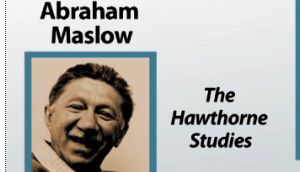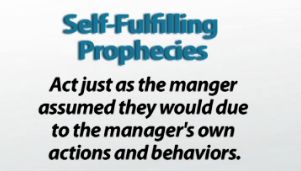Theory X & Theory Y: Two Types of Managers
After you watch the video and know the material, click HERE for the quiz.
Have you ever thought your boss despises you and all your co-workers? Or maybe you've lucked out and your superiors really encourage you to be yourself. This lesson describes the two types of managers you might have, Theory X and Theory Y. Find out how the idea of self-fulfilling prophecies affects employees actions according to Douglas McGregor.
The Assumptions of Douglas McGregor
Much like a bomb, assumptions are a dangerous thing to make - just the slightest little mistake and you can end up blowing yourself up! However, one person who seemed to be unafraid of self-inflicted explosions was Douglas McGregor, a behavior management theorist who was heavily influenced by both Abraham Maslow and the Hawthorne Studies. McGregor proposed that there were two types of managers: ones who assumed a negative view of their employees, also known as the Theory X managers, and others who assumed a positive view of workers, or the Theory Y managers. So grab your bomb repellent while we explore these two different types of managers by discussing the assumptions of each.
 |
Theory X
Xavier is a Theory X manager. When I say X, I don't mean the type that marks a treasure - in fact, quite the opposite is true. As a Theory X manager, Xavier believes that his workers:
- Hate the idea of having to go to work and do so only to earn a paycheck and the security that it offers.
- Are inherently lazy, lack ambition and prefer to be directed on what to do rather than assume responsibility on their own.
- Are self-centered and care only about themselves and not the organization (or its goals), making it necessary for the manager to coerce, control, direct or threaten with punishment in order to get them to work towards organizational goals.
- They also dislike change and tend to resist it at all costs.
Xavier assumes that his employees show up for work for their paycheck and the security that a regular, paying job offers. As soon as that need is satisfied, the employees have no additional motivation for coming to work. Therefore, Xavier believes his role as a manager is to coerce and control his employees to work towards organizational goals.
Theory Y
Yoko is a Theory Y manager, and when I say Y here, think 'why not.' Why not assume the best in people? As a Theory Y manager, Yoko believes her employees:
- Accept work as a normal part of their day, and it's right next to recreation and rest.
- They are not lazy at all. In fact, when the proper motivations and rewards are in place, employees are not only willing but purposely driven to seek out responsibility and challenges on their own.
- They're full of potential, and it's through their own creativity, ingenuity and imagination that organizational goals are met.
Theory Y assumes that when proper motivations are in place, employees are willing to seek out responsibility. 
Yoko assumes that her employees are full of potential and that it is her role as a manager to help develop that potential so that the employee can work towards a common organizational goal. Yoko must also try to harness the motivational energy of her employees through things such as giving them more autonomy, responsibility, power, trust and feedback and involving them in the decision-making process.
The Self-Fulfilling Prophecies
As the old saying goes, 'be careful what you wish for, because you just might get it.' McGregor cautioned both types of managers against what he called self-fulfilling prophecies, whereby an employee will act just as the manager assumed he or she would due to the manager's own actions and behaviors. Essentially, if you hold people to a certain expectation - whether that's good or bad - your own actions as a manager will influence those employees to act accordingly. A manager's behavior and expectations are as contagious as the plague. As such, McGregor acknowledged both types of managers as being a legitimate means of motivating employees, but he felt that you would get much better results through the use of Theory Y rather than Theory X.
 |
Lesson Summary
Douglas McGregor believed that there were two types of managers: Theory X and Theory Y. The role of the Theory X manager is to coerce and control employees to work towards organizational goals. The Theory X manager assumes employees hate the idea of having to go to work and do so only to earn a paycheck and the security it offers. They are inherently lazy, lack ambition and prefer to be directed on what to do rather than assume responsibility on their own. They are self-centered and care only about themselves and not the organization or its goals, making it necessary for a manager to coerce, control, direct or threaten with punishment in order to get them to work towards organizational goals. They also dislike change and tend to resist it at all costs.
The Theory Y managers believe their role is to help develop an employee's potential so that s/he can work towards common organizational goals. The Theory Y manager assumes that employees accept work as a normal part of their day right next to recreation and rest. They are not lazy at all. In fact, when proper motivations and rewards are in place, employees are not only willing but purposely driven to seek out responsibility and challenges on their own. The employees are full of potential, and it is through their own creativity, ingenuity and imagination that organizational goals are met.
McGregor cautioned both types of managers against what he called self-fulfilling prophecies, whereby an employee will act just as the manager assumed he or she would due to the manager's own actions and behaviors. McGregor acknowledged both types of managers as being a legitimate means of motivating employees, but he felt that you would get much better results through the use of Theory Y rather than Theory X.